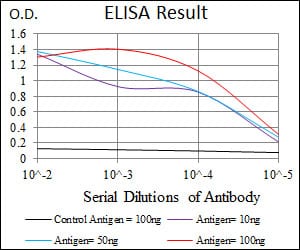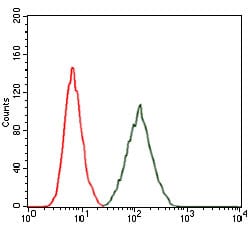

| WB | 咨询技术 | Human,Mouse,Rat |
| IF | 咨询技术 | Human,Mouse,Rat |
| IHC | 咨询技术 | Human,Mouse,Rat |
| ICC | 技术咨询 | Human,Mouse,Rat |
| FCM | 1/200 - 1/400 | Human,Mouse,Rat |
| Elisa | 1/10000 | Human,Mouse,Rat |
| Aliases | RAP1; KREV1; KREV-1; SMGP21 |
| Entrez GeneID | 5906 |
| clone | 5F8 |
| WB Predicted band size | 21kDa |
| Host/Isotype | Mouse IgG1 |
| Antibody Type | Primary antibody |
| Storage | Store at 4°C short term. Aliquot and store at -20°C long term. Avoid freeze/thaw cycles. |
| Species Reactivity | Human |
| Immunogen | Purified recombinant fragment of human RAP1A expressed in E. Coli. |
| Formulation | Purified antibody in PBS with 0.05% sodium azide |
+ +
以下是3篇关于RAP1A抗体的参考文献及其简要摘要:
1. **文献名称**: "RAP1A mediates transcriptional control of immune receptors in plants"
**作者**: Li, X., et al.
**摘要**: 该研究利用RAP1A特异性抗体通过Western blot和免疫共沉淀技术,证明RAP1A通过调控植物免疫受体的转录活性参与抗病反应,揭示其在植物先天免疫中的关键作用。
2. **文献名称**: "RAP1A regulates cell adhesion and migration via integrin signaling in cancer"
**作者**: Zhang, Y., et al.
**摘要**: 通过免疫荧光和流式细胞术结合RAP1A抗体,研究发现RAP1A通过整合素信号通路调控肿瘤细胞黏附与迁移,为靶向RAP1A的癌症治疗提供理论依据。
3. **文献名称**: "Role of RAP1A in neuronal differentiation and synaptic plasticity"
**作者**: Tanaka, H., et al.
**摘要**: 利用RAP1A抗体进行组织特异性敲除实验,发现RAP1A通过调控MAPK/ERK通路影响神经元分化及突触可塑性,提示其在中枢神经系统发育中的功能。
4. **文献名称**: "RAP1A antibody-based detection of protein-protein interactions in GTPase signaling"
**作者**: Smith, J.P., & Lockyer, P.J.
**摘要**: 该研究开发了一种高特异性RAP1A抗体,用于免疫沉淀和质谱分析,揭示RAP1A在GTP酶信号网络中与多种效应蛋白的相互作用机制。
**Background of RAP1A Antibody**
RAP1A (Ras-related protein 1A) is a small GTPase belonging to the RAS superfamily, involved in regulating diverse cellular processes, including cell adhesion, proliferation, differentiation, and intracellular signaling. It functions as a molecular switch, cycling between an active GTP-bound state and an inactive GDP-bound state. RAP1A interacts with effector proteins such as integrins, MAPK pathways, and regulators like GTPase-activating proteins (GAPs) or guanine nucleotide exchange factors (GEFs) to mediate signaling cascades. Dysregulation of RAP1A has been linked to cancers, immune disorders, and cardiovascular diseases.
RAP1A antibodies are essential tools for studying its expression, localization, and function in biological systems. These antibodies are commonly used in techniques like Western blotting, immunohistochemistry (IHC), immunofluorescence (IF), and flow cytometry. Specific RAP1A antibodies target distinct epitopes, enabling the detection of endogenous RAP1A isoforms and post-translational modifications. Validated antibodies help elucidate RAP1A’s role in pathways like cAMP signaling, cell-matrix interactions, and vesicle trafficking.
Due to its homology with other RAS family members (e.g., RAP1B), antibody specificity is critical to avoid cross-reactivity. Research utilizing RAP1A antibodies has advanced understanding of its dual roles as a tumor suppressor or promoter, depending on context, and its potential as a therapeutic target. Commercial RAP1A antibodies are often validated across species (human, mouse, rat) and cited in studies exploring cancer metastasis, platelet activation, and neurological processes.
×